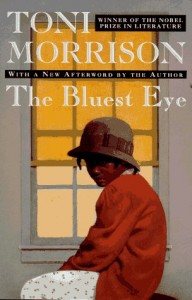 National Coalition Against Censorship brought to light a recent ban on teaching Toni Morrison’s The Bluest Eye in California’s Colton Joint Unified School District last month, which largely went under the radar not just in national news, but in Colton itself. At a school board meeting on February 6th, the agenda was set to vote on a list of 500 books that comprised the Secondary Core and Extended Reading List. The board voted four-to-two to remove The Bluest Eye and pass the rest of the list. Dan Flores, one of the opposing votes, told the local paper,
National Coalition Against Censorship brought to light a recent ban on teaching Toni Morrison’s The Bluest Eye in California’s Colton Joint Unified School District last month, which largely went under the radar not just in national news, but in Colton itself. At a school board meeting on February 6th, the agenda was set to vote on a list of 500 books that comprised the Secondary Core and Extended Reading List. The board voted four-to-two to remove The Bluest Eye and pass the rest of the list. Dan Flores, one of the opposing votes, told the local paper,
There are dozens of books on the list that deal with controversial issues. Yet, the only one being removed is by Toni Morrison, one of the most prominent black female authors of recent time. Her literature speaks to the African American experience in America and I could not personally support removing one of her books from our reading list altogether.
Lucy Leyva, a teacher at Colton High School told ABC 7, “It’s awful. It’s awful what the protagonist goes through, yet important to talk about. I’m upset and hurt that they cannot trust what we as teachers know is best for our students.”
Targeted
This school board vote happens every three to five years, typically without incident. According to NCAC, this year a group coordinated the attack on The Bluest Eye in secret,
No notice was given that The Bluest Eye, or any other particular book, would be discussed, much less challenged, at the meeting.
According to press reports, opponents of the book had secretly lobbied board members before the meeting took place. The meeting agenda contained dozens of items. Yet all but one comment from attending citizens was about The Bluest Eye – all calling for its removal. No one spoke in the book’s favor, because no notice had been given that it would be challenged. Some two dozen opponents of the book attended the meeting.
This targeting of Toni Morrison’s work is in no way isolated. Her books have regularly appeared on American Library Association’s Most Frequently Challenged and Banned annual lists. In recent years her books have popped up on circulated lists of books to challenge. Just last year in Florida, a local political group challenged 14 titles in a school district. Initially the Superintendent told the local news, she “found it difficult to defend [Toni Morrison’s Beloved] educational value at the middle school level, as well as in ‘some’ high school settings.” However, she opted to read these challenged books with the review committee and at the end of the process did defend Morrison’s work specifically, urging the board not to ban Morrison’s books just because they may make them feel uncomfortable.
A Life Fighting for Free Expression
Nobel Laureate and master author Toni Morrison passed away at 88 last year, leaving behind an unparalleled body of work and a world better for her being here. Morrison’s books are critically respected in the literary canon and successful in a commercial way that defies stereotypes in the highest echelons of literature. She spoke authentically about her experience, and was a vocal critic of censorship and often defended other writer’s works that were under fire.
Famously Morrison talked about how the first time she read Huckleberry Finn and how it incited within her a “muffled rage” but as an adult, she came to appreciate its merits. “The brilliance of Huckleberry Finn is that it is the argument it raises,” said Morrison. She also mentioned that calls to ban the book work were “a purist yet elementary kind of censorship designed to appease adults rather than educate children”– an observation which somehow encapsulates censorship in schools and libraries on a whole.
To see why these books are crucial to our improvement as a species, one only needs to read how Toni Morrison’s words have changed others, and then pick up a Toni Morrison book for themselves.